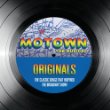 Motown The Musical
Motown The Musical
Lunt-Fontaine Theatre
New York, New York
It would be difficult to script a tale as compelling as the story of the birth and growth of Motown, America’s most celebrated record label. Created in Detroit with $800 of borrowed money by former boxer and factory worked Berry Gordy, Jr., Motown defied the business and cultural norms of the time to become “The Sound of Young America” and one of the most influential entertainment organizations in American history.
 Motown The Musical
Motown The Musical
Lunt-Fontaine Theatre
New York, New York
It would be difficult to script a tale as compelling as the story of the birth and growth of Motown, America’s most celebrated record label. Created in Detroit with $800 of borrowed money by former boxer and factory worked Berry Gordy, Jr., Motown defied the business and cultural norms of the time to become “The Sound of Young America” and one of the most influential entertainment organizations in American history.
It's been more than two decades since the first calls for a definitive Motown tribute on stage or screen. But surprisingly, for a label that was never shy about capitalizing on its history via dozens of duplicative CD compilations, Motown never strategically marketed its name and history in other important venues, including Broadway. So, it was met with a collective "it's about time" when Gordy announced last year that he would be creating a definitive Motown stage tribute. The result, Motown the Musical, hit Broadway this Spring to full houses.
While the Motown story was a cultural phenomenon, ultimately what made Motown special to so many people was the music -- a unique blend of soul and pop with subtle jazz underpinnings and a once-in-a-lifetime cast of singers, songwriters and players. Gordy saw his label as analogous to the auto factories of the 1960s, and his organization churned out the hits at a pace that would have made GM envious.
Motown the Musical successfully captures the energy and strength of the label's legendary discography, highlighting songs that everyone knows by heart and presenting them amid strong choreography and dizzyingly clever sets. From Gordy's pre-Motown compositions for Jackie Wilson through the label's less notable early 80s releases, the show features over 60 musical gems. That volume of hits requires an often frenetic pace to the show, with virtually every song moved uptempo, shortened or placed in medleys. Surprisingly, many of the label's most popular hits are barely touched, yielding to other, more questionable song choices. So, "My Girl" and "Heard it Through the Grapevine" each last about a minute, while Diana Ross's "Reach Out And Touch Somebody's Hand" is the unexpected show centerpiece, garnering a full 10 minutes (including audience participation).
While the music is divine and the production is crisp, the “Story” part of Motown the Musical is, to put it kindly, rather light. The play is set in 1983 at the time of the Motown 25 television special, with Gordy looking over the prior quarter century in flashbacks. The true history of the pioneering black-owned label and its mercurial, complicated leader is glossed over summarily, with the greatest focus being on the ill-fated romance between Gordy and Ross. But even that relationship is handled in the most cursory fashion, with the show simply indicating that Gordy was too busy building his musical empire to spend the time on his romantic relationship. The most intimate piece in this story line - a bedroom scene in which Gordy can't "perform" - is handled so quickly, without explanation, that it ends up an odd throwaway that adds nothing to the overall context. Meanwhile, the more nuanced story of the cultural phenomenon that was Motown is largely left on the cutting room floor, and Gordy is simply shown, both self-servingly and one dimensionally, as a visionary leader often underappreciated by his artists and producers, who leave him for bigger checks elsewhere.
Fortunately, it becomes clear early on that the story is secondary to the music in Motown the Musical. And once expectations are adjusted, Motown the Musical becomes quite a ride. The casting of the play is inspired, and it all begins with Brandon Victor Dixon in the role of Gordy. He wins the audience early on with a chilling version of Jackie Wilson's "To Be Loved" and he mesmerizes with every note thereafter. Felicia Boswell has Diana Ross's saucer eyes and sexiness, and provides a wonderful stage presence. The other leads, Charl Brown (as Smokey Robinson) and Bryan Terrell Clark (as Marvin Gaye) are convincing, and young Raymond Luke is a virtual dead ringer for the prepubescent Michael Jackson. Most other cast members play multiple roles, and their costume changes are as clever and believable as the jaw-dropping sets put around them.
Motown the Musical is by no means a perfect stageplay. It is more a tribute, a la Beatlemania, than an in depth look at one of America’s greatest stories. But once expectations are adjusted, the show is a non-stop musical pleasure, with 2+ hours of energetic, precise performances of some of the greatest music of our lifetime. In the end, Motown the Musical is simply a joyful musical trip through a time capsule that succeeds in leaving its audiences “Dancing in the Streets.” Recommended.
By Chris Rizik
